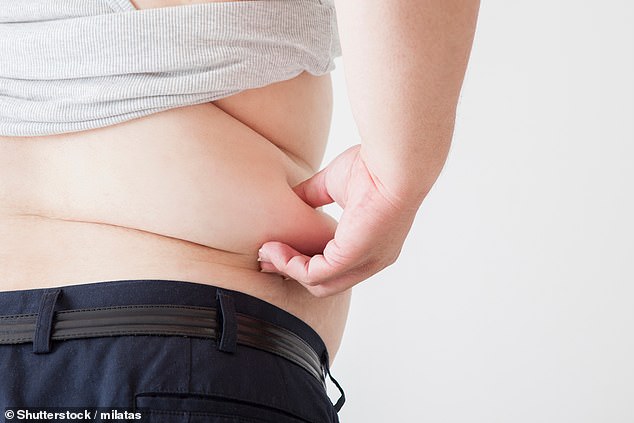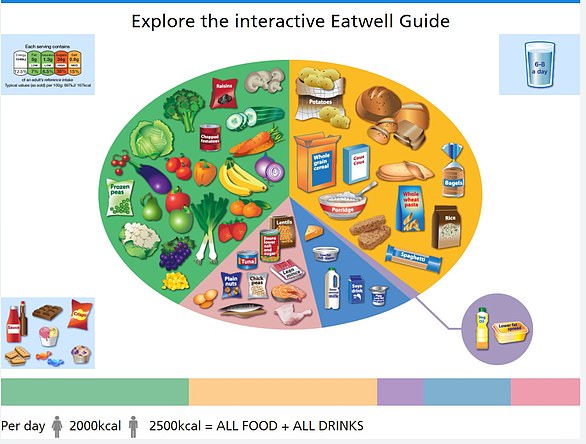Britons should be forced to measure their waists at work, according to a leading anti-obesity campaigner.
And their employers would even face fines if too many of their workers were too fat under the proposed Japanese-style measure.
The calls for action come after a study suggested that sick leave from obesity-related illnesses is seriously hampering British economic growth.
The unpublished study found that overweight people were 22 percent more likely to miss at least seven sick days a year compared to their healthy colleagues.
When this is combined with those who are obese, it could mean that up to 60 percent of the nation takes leave due to weight-related problems, such as diabetes or heart disease.
Calls for the Japanese-style measure to be introduced in the UK come after a study suggested time off work for obesity-related illnesses is severely hampering British economic growth (file image)
Tam Fry, of the National Obesity Forum, said the answer to Britain’s weight-related workforce problem was to take inspiration from Japan and its ‘metabo’ law.
The law, enacted in 2008, requires all Japanese workers between 40 and 70 years old to have their waists measured by their employer once a year.
If an employer has too many fat employees, they may face government fines.
Workers are protected from dismissal, leading to employer-led incentives to help them lose weight, from company exercise programs to referrals to weight management courses.
Fry said the system works incredibly well and called for a similar measure to be introduced in the UK to tackle the “horrendous” obesity epidemic.
“Japan has a 6 percent obesity level, we have a 28 percent obesity level,” he said.
“We have to start taking steps like that to reduce what is now a horrendous problem.”
However, he added that other additional measures should also be considered.
He added that the damage was not only to people’s health but also to the economy.
“The damage to the Public Treasury is really quite dramatic,” he said.
“When there are so many workers who can’t go to work it’s going to cause a real headache somewhere.”
Fry said ministers could no longer afford to fear being labeled as instruments of the “nanny state” or bowing to critics who said such measures were “a disgrace or an infringement on civil liberties”.
“We are losing £98 billion a year as a result of obesity and the many problems it causes,” he said.
“Medical problems, lack of people to work affect production and (as a result) a weaker economy.”
He said that while a British metabo-style law might look quite different from the Japanese original, he said the point was to do something within the workspace.
‘You send them to weight management courses, and in all those things, if you have someone who is overweight, you don’t just sit there and say “tough.” Do something about it,’ he said.
He acknowledged that such a move would be potentially unpopular, but noted that so were seat belt laws when they were first introduced.
‘How dare the Government tell us to put on our seat belts every time we drive a car? And if you don’t put it on, they’ll fine you,’ he said.
“So now everyone puts their seat belt on.”
But even if the Government changed tomorrow and promised to introduce a metabo-style law, Fry said it would not be a quick fix and other anti-obesity measures would still be needed.
“It will take a little time to introduce something like this to this country,” he said.
“But the fact is, it works.”
The researchers of the new study, who presented their findings at the European Obesity Congress in Venice, revealed that the UK is “among the worst” of the 28 countries they examined for absenteeism due to obesity.
Data from the UK showed that those classified as obese, with a BMI over 30, were almost a quarter (23 per cent) more likely to be absent from work for any period of time. People with severe obesity (with a BMI over 40) were more than twice as likely (118 percent) to take time off.
Last month, the Prime Minister announced plans to tackle the “sick leave culture” with sweeping reforms to the benefits system. But experts said the plans have little chance of success unless ministers tackle obesity.
A report in December showed that the UK has the third highest proportion of people with obesity in the Organization for Economic Co-operation and Development, with an estimated annual cost to the UK economy of £98 billion.
Overall, two-thirds of all British adults are now overweight, compared to just half in the mid-1990s. Of these, a quarter are obese.



